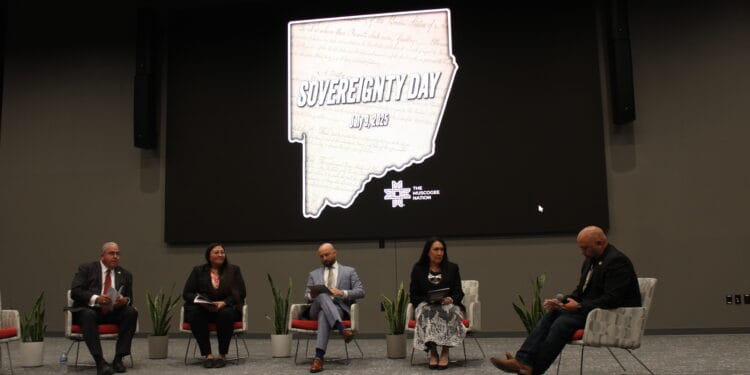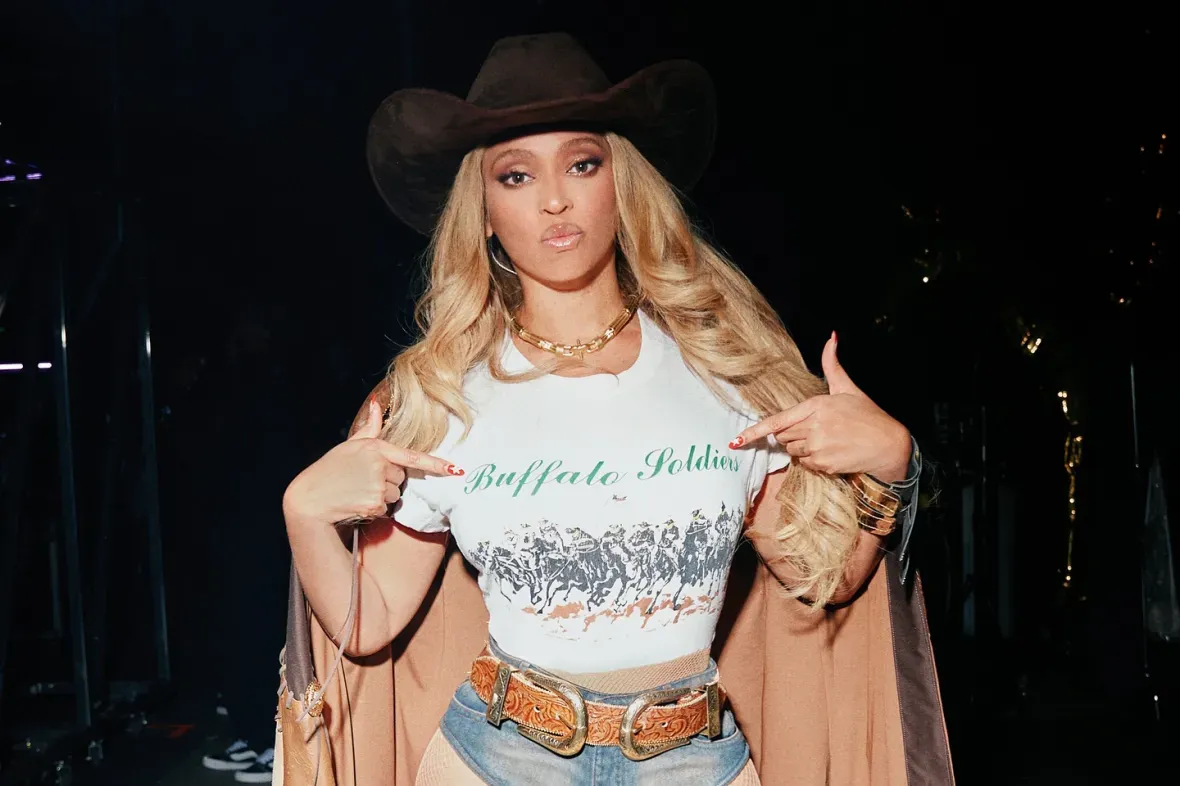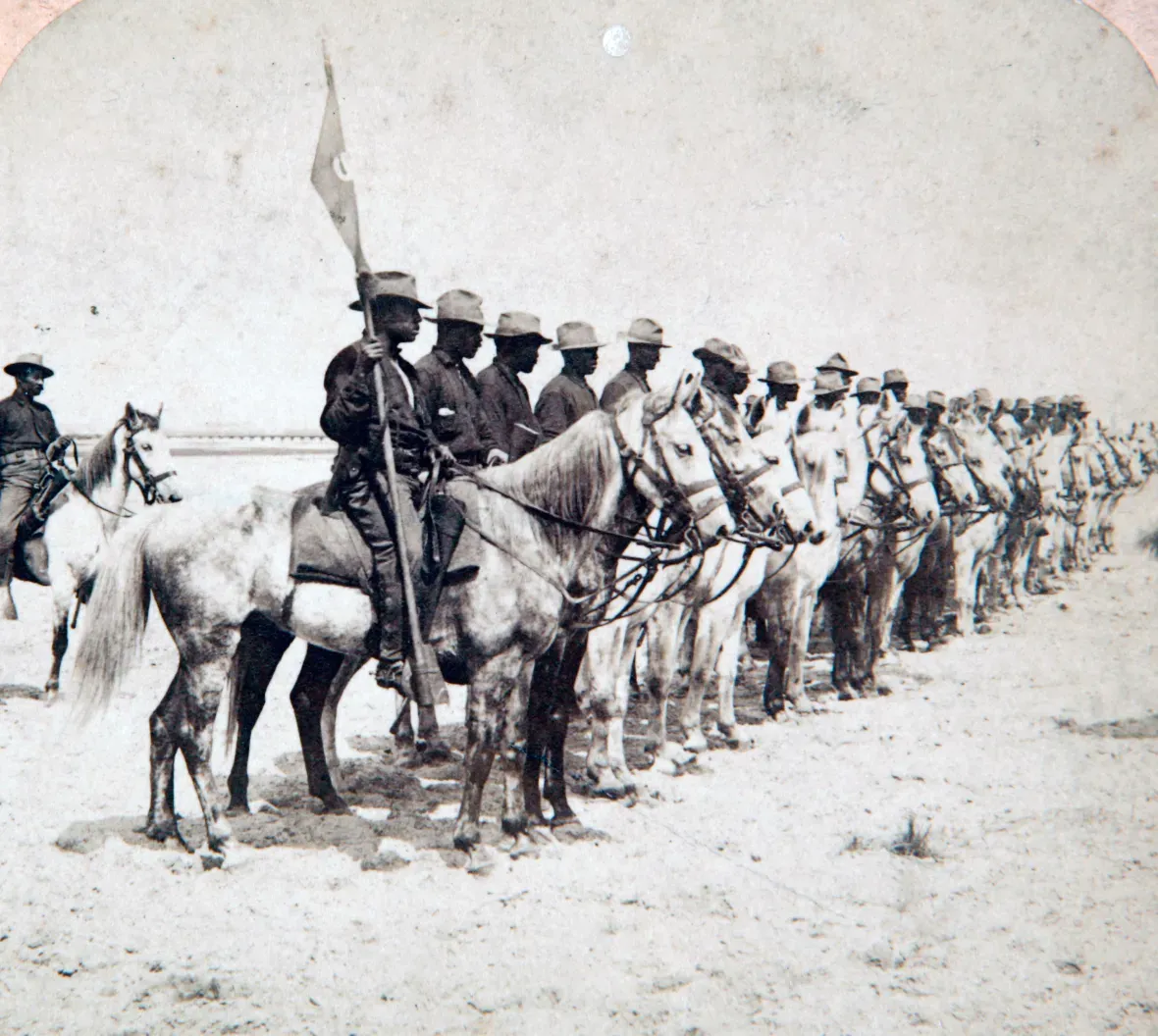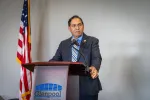

MCN celebrates Sovereignty Day

Tribal leaders and lead counsel reflect on the historic Supreme Court decision that affirmed Muscogee Nation’s Reservation
“The Nation had never ceased to function as a robust government. That’s what made all the difference in the (McGirt) case. That’s what gave the Supreme Court Justices the comfort to do the right thing and follow as Judge Gorsuch said ‘The rule of law as opposed to the will of the strong’.” McGirt Lead Attorney Riyaz Kanji
by Braden Harper, Mvskoke Media
OKMULGEE – A Sovereignty Day program was held at the College of the Muscogee Nation on July 8 to mark the fifth anniversary of the historic McGirt v. Oklahoma ruling. Event speakers included Muscogee (Creek) Nation Principal Chief David Hill, lead attorney for the MCN in McGirt v. Oklahoma Riyaz Kanji, and Muscogee National Council Speaker Randall Hicks.
The main feature of the program included a panel of Tribal leaders including Deputy Attorney General Geri Wisner, Deputy Secretary of Health Tim Hicks, Secretary of Culture and Humanities RaeLynn Butler, and Chief of Staff Jeff Fife. MCN Press Secretary Jason Salsman moderated the panel.
The event commissioned a time capsule with contributions from Tribal departments including documents, photos, artwork, and other various items that captured moments in Mvskoke history from 2025.
Chief Hill remarked that the day the U.S. Supreme Court handed down its decision was a paramount one for the Nation because it reaffirmed the United States’ promise outlined in the Treaty of 1866. According to Chief Hill, although sovereignty has not always been properly recognized and respected, it has shaped the Nation into what it is today.

“July 9, 2020, changed Muscogee Creek Nation. July 9, 2020, changed Oklahoma. July 9, 2020, changed Indian Country,” Chief Hill said. “They tried to bury us, but they didn’t know that they were planting the seeds. That’s who we are today.”
The McGirt case heard oral arguments during the height of the Covid-19 pandemic, when court proceedings were conducted by teleconference. Kanji argued the Nation’s case before SCOTUS in front of a computer screen in his living room. According to Kanji, their strategy for winning was to simply tell the story of the Mvskoke Nation.
“When people ask us, ‘how did we win the McGirt Decision?’ The answer is that we were able to vindicate the Creek Nation’s sovereignty because the Creek Nation exercises its sovereignty in such a robust way,” Kanji said. “We simply had to tell the story. The story was being written through the incredible governance by the Creek Nation.”
The story involved MCN Lighthorse Police and its efforts assisting other law enforcement agencies on the reservation. Kanji’s team also told the story about the Nation’s health department and the services they provided to all Tribal citizens of federally-recognized tribes, not just Mvskoke citizens. Education, including Headstart and the College of the Muscogee Nation, were both integral to painting the picture of how the Nation exercises sovereignty.
Speaker Hicks described sovereignty as “the heartbeat of the Nation that has endured all odds.” He remarked that sovereignty predates colonization, it is what has allowed the Mvskoklvke to thrive today.
“Sovereignty is not a word we celebrate only in ceremony or in courtrooms. It’s the spirit that moves through our governance, our language, our lands and our daily lives,” Speaker Hicks said. “Long before the founding of the United States the Muscogee Nation governed itself. We held council fires, we honored a clan’s responsibilities. We protected our homelands. That sovereignty was not granted to us by a treaty. It existed long before treaties. It is not bestowed by court, but is undeniably affirmed by a case like McGirt vs. Oklahoma.”
Although the decision reaffirming sovereignty has been the rule of law for the past five years, Kanji said the fight to progress and preserve continues on.
“The five years since the McGirt Decision had been decided has been both inspiring and challenging,” Kanji said. “Inspiring because the Nation has continued to govern and has expanded its governance and has risen to the challenge of the decision. Challenging because as Principal Chief said, there remain opponents, great opponents of this exercise of sovereignty.”
After the panel, Chief Hill and Kissee locked and sealed the Muscogee Nation Time Capsule. The capsule will be stored in the new Citizenship Services Building and will remain there until it is scheduled to be opened on July 9, 2050.
In observance of Sovereignty Day, all MCN Offices will be closed on Wednesday, July 9

OSU, Caddo Nation partnership to create bolster tribal economy, workforce development

Caddo Nation and Oklahoma State University are working together to boost the tribal nation’s economy, workforce development and open a pathway to higher education.
By Sarah Liese (Twilla), KOSU
Brandon Dinsmore (Cherokee) envisions Oklahoma’s future in 30 years. His vision is centered on autonomous tribal nations, as his work involves building partnerships with tribes at the Oklahoma State University Institute of Technology.
“When you look at a map or you're flying over it, the mental imagery that you should have is, ‘Oh, yeah in the middle of this one country, there's this whole cluster of other little countries and we call them tribal nations,’” Dinsmore said.
Powerful sovereignty in the 21st century requires tribal economic stability — a main focus in Dinsmore’s recent project with the Caddo Nation.
The partnership between OSUIT and the Caddo Nation Economic Development Authority was announced last week, highlighting the tribal nation’s ambitious plans to boost its economy and lower unemployment for Caddo citizens and offer them a track to career advancement opportunities. The collaboration aligns with Caddo Nation’s 477 plan, which cuts through administrative red tape by allowing multiple funding streams to be combined and used to benefit tribal workforce development.
Currently, the nation’s development authority oversees multiple businesses, including McKee’s Indian Store, construction firm Arrowood Kakinah Enterprise and SAKU, a solar power installation company. There are about 6,000 enrolled citizens of the Caddo Nation, headquartered in Binger, 60 miles west of Oklahoma City.
Zackeree Kelin, CNEDA Vice President, said all the entities they oversee will eventually need Caddo Nation employees, and the partnership with OSUIT can help train them and work toward a longer-term goal to build up their business ventures.
“The idea is to platform citizens by giving them access to projects that we might be working on, or that our enterprises might be working on,” Kelin. “And allow them to use that as an entry point and then help them navigate the career path in those types of industries.”
OSUIT is tasked with developing industrialized or custom training programs, which could be in-person at the OSUIT’s Okmulgee campus, virtual or both, depending on the specific needs.
While Caddo citizens selected for workforce training may not be enrolled students at OSU, they can use those trainings as potential college credits if they later decide to attend the university.
“It's a way of saying I have industry certifications backed by higher education,” Dinsmore said. “And if I choose at any point in the future, for whatever reason —personal growth or because I want to get that leadership position and I need a degree — I can go ahead and turn this into college credit and decrease the amount of time that I need to spend on the degree.”
Dinsmore has partnered with other tribal nations in the past, including the Cherokee Nation, Cheyenne and Arapaho Tribes and the Muscogee Nation. He said much of his recent work has consisted of building out training programs for broadband installations.
“I hate to use the words ‘workforce development’ because it sounds so corporate and sterile,” Dinsmore said. “It's more than that. It's like, this is how you treat people. This is how we take care of each other.”
Currently, the programming plans for the Caddo Nation are not concrete, as CNEDA and OSUIT officials are still finalizing the details.
The project date for Caddo citizens to begin applying for these training opportunities is estimated for this fall. The areas Kelin noted the programs will focus on are in construction, infrastructure and renewable energy development.
To learn more about the OSUIT and CNEDA partnership, visit OSU’s website.
Oklahoma State University is the license holder and a financial supporter of KOSU, but we report on them just as we do any newsmaker.
Beyoncé’s dehumanising shirt reminds us why history still matters

Buffalo Soldiers deserve to be celebrated. But their story is more complex than a pop culture slogan, writes a Keetoowah Cherokee journalist
by Troy Littledeer
I do not wish to “cancel” Beyoncé but to extend an invitation. We welcome her to the Cherokee Nation to visit our museums, sit with our elders and talk with our tribal leaders. To experience the beauty, grace and resilience of our culture, which has existed from time immemorial.
Because if the United States is serious about its ideals, we must begin by telling the truth, no matter how dark and difficult.
When Beyoncé brought her Cowboy Carter tour home to Texas, anticipation was huge for what should have been a warm reunion. But a photo posted to Instagram from a previous performance in Paris sparked a challenging conversation — one many of us in Indian Country are still processing.
She was wearing a Buffalo Soldiers T-shirt with images of the African-American regiment who served in the US army after the Civil War.
Beyoncé came under fire for the quote written on the back: “Their antagonists were the enemies of peace, order and settlement: warring Indians, bandits, cattle thieves, murderous gunmen, bootleggers, trespassers and Mexican revolutionaries.”
At a glance, it might sound like something lifted from an old western — bold, gritty, cinematic. But if you’re Native or Mexican, that kind of language boils down to erasure and dehumanisation. We’ve heard that narrative before: Indigenous Americans cast as the “problem”, the ones standing in the way of peace, progress and “order”.
And the worst part? That framing is beginning to rear its head again, more often than people realise.
When those words show up on stage — on a shirt worn by one of the most influential artists in the world during a celebration of black freedom — it stings. Not because we believe Beyoncé meant harm, but because harm doesn’t always require intent to cause hurt.
The story of the Buffalo Soldiers

To be clear: the Buffalo Soldiers deserve to be remembered. These were black men who served in segregated US army units beginning in 1866, after the end of the American Civil War. They included formerly enslaved and Union veterans trying to build lives in a country that still denied them basic rights.
Even after the Civil War, black Americans were locked out of opportunity by Jim Crow laws and racist violence.
Buffalo Soldiers served with bravery and grit — no question. But their story also has a more complicated side.
In the 1870s Red River War, they assisted the army in removing Comanche and Kiowa people from their homelands. Two decades later, members of the 9th Cavalry were at Pine Ridge, South Dakota, during the lead-up to the Wounded Knee Massacre, where more than 250 Lakota men, women and children were killed and left in the snow.
Those weren’t just military engagements. They were part of a larger federal campaign that stripped Native nations of land and sovereignty. Between 1850 and 1887, two thirds of Native landholdings were slashed from 150 million acres to 50 million, as the government continued its campaign of slaughter and land grabbing.
Indeed, history is messy and complex. These black soldiers were navigating a racist system that gave them limited choices. But the pain their actions caused Native communities still lingers. That’s part of the story, too.
Why this history is so important now
Since the photo surfaced, I’ve seen Beyoncé’s Native fans express real hurt. Some had planned to see her in Houston. Then came that quote — words that justified land theft and bloodshed — printed on a shirt during a “liberation tour” as a political fashion statement.
What stood out, though, was the response. Non-Native allies also voiced their outrage, and that solidarity mattered. It reminded us that we’re not alone in asking for a fuller, more respectful and honest account of our histories.
The truth is, this country wasn’t built only by the Founding Fathers. It was shaped by the enslaved, the displaced and the marginalised. Enslaved Africans laid the foundation of the US economy. Immigrants — Chinese labourers, Irish steelworkers, Mexican farmhands — built its bones. And Native peoples gave up their lands and vast resources — often obtained through genocide and broken treaties.
Our own communities have had to face hard truths as well. The Cherokee Nation — from which my tribe, the United Keetoowah Band of Cherokee Indians, descends — once enslaved black people. A treaty signed after the Civil War guaranteed citizenship to freed men, but rights were often delayed or denied for generations. That is part of our legacy — and we are still reckoning with it.
History isn’t clean. But when we’re honest, we can begin the process of reconciliation and healing.
As fireworks light up the sky, hotdogs get served up and flags are waved on Friday, not everyone will remember the true history of Independence Day. American values may have been born out of the notion that all people are created equal — but liberty and justice didn’t arrive all at once.
Troy Littledeer is a Keetoowah Cherokee journalist and former media director for the United Keetoowah Band. Littledeer has become a leading voice for tribal press freedom, earning the 2025 Tim Giago Free Press Award from the Indigenous Journalists Association
United Indian Nations of Oklahoma condemns Ann Coulter’s comments on Native Americans

Shawnee Chief and UINO Chairperson Ben Barnes today released the following statement repudiating conservative media pundit Ann Coulter's inflammatory statement regarding Native Americans.
“Ann Coulter’s vile comment that ‘we didn’t kill enough Indians’ is not only morally repugnant—it is a stain on the conscience of this country.
As a Tribal Nation whose people endured forced removals, massacres, broken treaties, and generations of erasure, we do not need reminders of America’s darkest chapters. We live with the consequences every day—yet we continue to stand, speak our language, raise our children in our traditions, and govern ourselves with dignity.
Ms. Coulter’s words dishonor every value this nation claims to uphold, and they have no place in any civilized discourse.
But let us be clear: we do not respond with hate. We respond with truth, resilience, and the strength of our ancestors. We are still here. We are still sovereign. And we are not going anywhere.”
— Ben Barnes, UINO Chairperson and Chief of the Shawnee Tribe.







